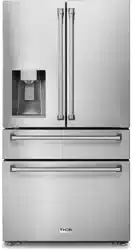Loading ...
Loading ...
Loading ...

Do not store beer, beverage or other fluid contained in bottles or
enclosed containers in the freezing chamber of the refrigerator;
or otherwise the bottles or enclosed containers may crack due to
freezing to cause damages.
Freezing chamber
5
Correct Disposal of this product:
This marking indicates that this product should not be disposed with other household
wastes throughout the EU. To prevent possible harm to the environment or human health
from uncontrolled waste disposal, recycle it responsibly to promote the sustainable reuse
of material resources. To return your used device, please use the return and collection
systems or contact the retailer where the product was purchased. They can take this
product for environmental safe recycling.
Refrigerant and cyclopentane foaming material used for the refrigerator are flammable.
Therefore, when the refrigerator is scrapped, it shall be kept away from any fire source and
be recovered by a special recovering company with corresponding qualification other than
be disposed by combustion, so as to prevent damage to the environment or any other harm.
When the refrigerator is scrapped, disassemble the doors, and remove gasket of door and
shelves; put the doors and shelves in a proper place, so as to prevent trapping of any child.
1.7 Warnings for disposal
This refrigerator can not be hooked up to a GFCI outlet.
1 SAFETY WARNINGS
Warning for energy
1)Refrigerating appliances might not operate consistently (possibility of defrosting of contents or
temperature becoming too warm in the frozen food compartment) when sited for an extended period of
time below the cold end of the range of temperatures for which the refrigerating appliance is designed.
2)The fact that effervescent drinks should not be stored in food freezer compartments or cabinets or in
low-temperature compartments or cabinets, and that some products such as water ices should not be
consumed too cold;
3)The need to not exceed the storage time(s) recommended by the food manufacturers for any kind of
food and particularly for commercially quick-frozen food in food-freezer and frozen-food storage
compartments or cabinets;
4)The precautions necessary to prevent an undue rise in the temperature of the frozen food while
defrosting the refrigerating appliance, such as wrapping the frozen food in several layers of newspaper.
5)The fact that a rise in temperature of the frozen food during manual defrosting, maintenance or
cleaning could shorten the storage life.
6)The necessity that, for doors or lids fitted with locks and keys, the keys be kept out of the reach of
children and not in the vicinity of the refrigerating appliance, in order to prevent children from being
The appliance should be located in the coolest area of the room, away from heat producing
appliances or heating ducts, and out of the direct sunlight.
Let hot foods cool to room temperature before placing in the appliance. Overloading the appliance
forces the compressor to run longer. Foods that freeze too slowly may lose quality, or spoil.
Be sure to wrap foods properly, and wipe containers dry before placing them in the appliance.
This cuts down on frost build-up inside the appliance.
Appliance storage bin should not be lined with aluminum foil, wax paper, or paper toweling.
Liners interfere with cold air circulation, making the appliance less efficient.
Organize and label food to reduce door openings and extended searches. Remove as many
items as needed at one time, and close the door as soon as possible.
locked inside.
Energy saving tips
1.6 Warnings for energy
Loading ...
Loading ...
Loading ...
